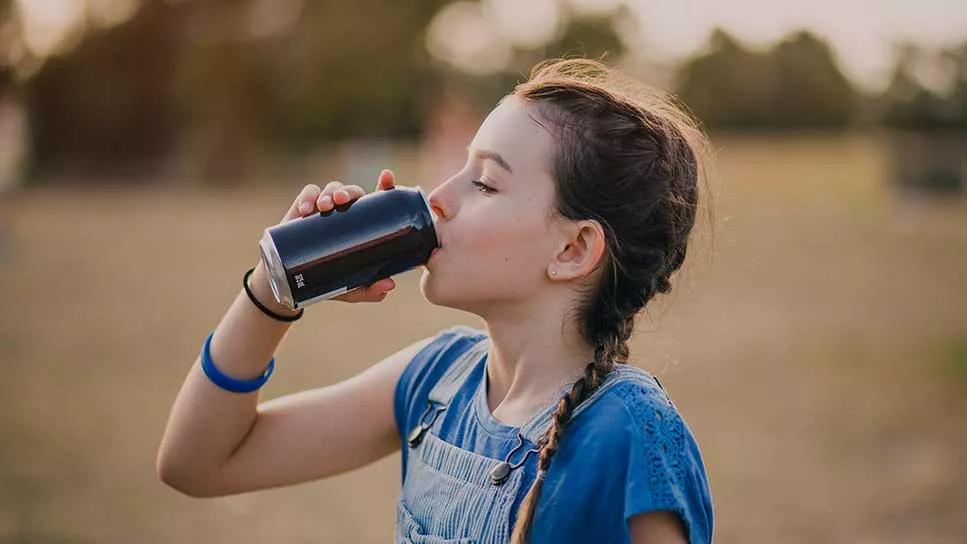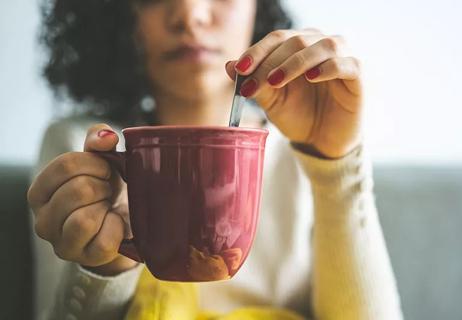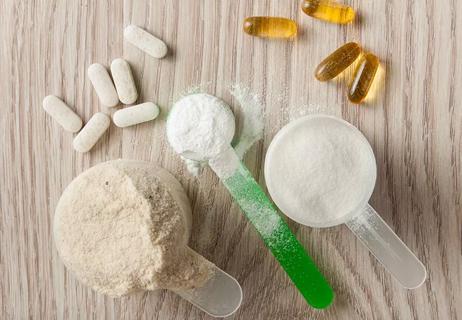No amount of caffeine is safe for kids under 12, and kids 12 to 17 should be cautious about how much they consume

They say imitation is the sincerest form of flattery. But as a parent, there’s one habit you want to be sure your kids don’t pick up: Your daily cup(s) of coffee and any other caffeine.
Advertisement
Cleveland Clinic is a non-profit academic medical center. Advertising on our site helps support our mission. We do not endorse non-Cleveland Clinic products or services. Policy
“For kids, there are a lot of potential health implications of caffeine,” says pediatric endocrinologist Roy Kim, MD.
So many, in fact, that the American Academy of Child and Adolescent Psychiatry says there’s currently no proven safe dose of caffeine for children under 12 and that all children under the age of 18 should avoid energy drinks entirely.
Here’s what you need to know about kids and caffeine, including what it can do, how much is safe and at what age kids should be allowed to consume caffeine.
Although people of all ages are susceptible to the effects of caffeine, most healthy adults can handle it in their daily lives. But kids are extra sensitive to caffeine’s effects. This is perhaps, in part, because their brains aren’t yet fully developed and they don’t necessarily have the wisdom and restraint to know when they’ve consumed too much. The result is that children and teens are perfectly poised to experience the following adverse side effects from drinking caffeine, especially when they’ve ingested too much:
Advertisement
If you’re thinking, My kid would never touch a cup of black coffee anyway, you’re probably right. But coffee isn’t the only source of caffeine kids are likely to consume.
One study found that 73% of kids in the U.S. ages 2 to 11 consume caffeine on a daily basis, with most of it coming from soda. Coffee and energy drinks (which became popular among kids in the early 2000s and continue to increase in popularity) are also a factor. And caffeine is found in other foods and beverages, like tea and hot chocolate, and some candy, gum and mints.
So, if it feels like caffeine is hard to avoid, what should you watch out for when it comes to your kids and caffeine? Dr. Kim explains.
If you’ve ever heard someone say that they only drink decaf in the afternoons, it’s probably because they have trouble sleeping after drinking late-day caffeine. Symptoms can include trouble falling asleep, frequent wake-ups and overall shorter duration of sleep.
Sleep disruptions are associated with all kinds of health issues in kids and adults alike, making caffeine particularly risky for young people who are still growing. And studies have shown that developing brains can be particularly sensitive to caffeine’s effects through early adulthood and cause a cycle of chronic fatigue and caffeine reliance.
“More and more, impaired sleep is recognized as a source of a lot of problems for child development, including things like low attention span and low alertness at school,” notes sleep-medicine physician Lauren Goldman, MD. “It can also cause symptoms like headaches, and can alter kids’ appetite and insulin levels, which may lead to other health issues.”
Caffeine may offer a short-term solution to low energy levels, but when our bodies are zapped of real, long-lasting energy, a lack of sleep can lead to:
“Insufficient sleep in adolescents has also been shown to increase the use of alcohol, tobacco and other illicit substances,” Dr. Goldman adds.
Caffeine stimulates your central nervous system, which makes you feel more perked up and attentive. But too much caffeine can take it too far — and children are particularly sensitive to caffeine’s anxiety-inducing effects.
Studies show that consuming high amounts of caffeine (like those found in energy drinks) is associated with higher levels of stress, depression and anxiety in kids.
Advertisement
Knowing that caffeine contributes to sleep issues further compounds many of these mental health concerns.
“Sleep and mental health go hand-in-hand,” says Dr. Goldman. “When you’re not sleeping well, your overall mental health and well-being decline. When your mental health declines, it can impact your sleep by either making it difficult to sleep or making you overly sleepy or fatigued during the day.”
Any adult who’s tried to go without their daily espresso knows that it’s not easy to quit a caffeine habit. That’s because, at the end of the day, caffeine is a stimulant that’s hard to give up. When you quit cold turkey, you might experience shakiness, irritability and headaches because your body can become dependent on its availability.
“Caffeine is a stimulant, and it does have some addictive properties,” Dr. Kim reiterates. “In people who get used to it, going without it can cause them to crave it, to need to get that fix. And that’s not a good thing to see occurring in kids.”
Caffeinated products marketed to the younger crowd — like soda, energy drinks and elaborate coffee concoctions that taste more like milkshakes — are often laden with sugar. And sugar, of course, is associated with a variety of health problems.
Advertisement
“Caffeinated drinks often come loaded with sugar, so their consumption is directly tied to an increase in body weight and obesity,” Dr. Kim warns. Sugar is also associated with higher risks of:
Energy drinks in particular have become a priority of concern for many parents and caregivers because they’re chock-full of sugar and have been known to contain an exorbitant amount of caffeine far above the safely recommended daily allowance (even for adults).
The U.S. Food and Drug Administration (FDA) doesn’t typically regulate the amount of caffeine contained in energy drinks — which means you can never be 100% certain about the amount of caffeine their labels say they contain. Why? Because energy drinks are classified as dietary supplements and aren’t legally monitored in the U.S.
Still, the FDA was recently called to investigate some energy drinks because of potential harm to kids because of the level of caffeine they contain — one can of Prime energy drink, for example, contains enough caffeine equivalent to six cans of Coke or nearly two Red Bulls. This statistic becomes even more alarming when you consider that kids often don’t stop at having just one of these beverages at a time.
Advertisement
More to the point: In a 2022 randomized, double-blind, clinical study involving 26 children and adolescents, researchers found energy drink consumption led to an increase in supraventricular extrasystoles (accelerated, skipped and irregular heartbeats). Those results suggest higher doses of caffeine, particularly in children with preexisting heart conditions, could lead to dangerous and life-threatening outcomes.
Here’s the harsh truth: No amount of caffeine is proven safe for kids 12 and under. And pediatric guidelines recommend teens should consume no more than 100 milligrams of caffeine per day, which amounts to one cup of coffee or two cans of soda. That means energy drinks should be avoided by anyone under the age of 18. In fact, the American Academy of Pediatrics says energy drinks aren’t safe for kids, period.
If increasing your kids’ energy levels is the main motivator behind drinking caffeine, there are healthier alternatives to consider.
When it comes to rest and restoration, sleep is the best solution. The American Academy of Sleep Medicine recommends the following sleep durations by age:
And although your kids might argue that some of their favorite foods and drinks contain caffeine, there are ways to satisfy their need for sweets without starving their interest.
Learn more about our editorial process.
Advertisement

This common stimulant can help you feel more awake, alert and focused, but too much of it can cause side effects

This popular stimulant has various impacts on your brain, heart, digestive system and other body systems

There’s no proven way to remove the natural stimulant from your body, but you can counter its effects by staying hydrated and getting in some movement

Don’t make the mistake of stopping cold turkey

These caffeine-packed supplements can give your workouts a boost

The caffeine and natural acids in coffee may trigger acid reflux, but there are ways to lessen the effects

From playful movement to strength-building, kids need exercise to stay healthy and strong

Start weaning your toddler off daytime pacifier use by 12 months old to help prevent dental issues and speech delays

Wearing a scarf, adjusting your outdoor activities and following your asthma treatment plan can help limit breathing problems

Your diet in the weeks, days and hours ahead of your race can power you to the finish line

When someone guilt trips you, they’re using emotionally manipulative behavior to try to get you to act a certain way